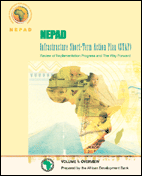
Background
In May 2002, a NEPAD Short-term Action Plan for Infrastructure (STAP) was produced.
The importance accorded to infrastructure in the NEPAD agenda reflects the fact that one of the priorities
of NEPAD is the promotion of regional integration in the continent to overcome the lack of economies
of scale. Bridging the infrastructure gap has been identified as an important element in promoting
regional integration. Infrastructure is also an important element in reducing Africa’s economic
marginalisation. There can be no meaningful development without trade – and there can be no trade
without adequate and reliable infrastructure.
The 2002 STAP outlined NEPAD’s response to the challenges facing the sector under
four areas:
-
facilitation – the establishment of the policy, regulatory and institutional frameworks to
create a suitable environment for investment and efficient operations;
-
capacity building-initiatives to empower the implementing institutions to perform their
mandates;
-
investment – in physical and capital projects; and
-
studies – to prepare future projects.
NEPAD’s role in ensuring the successful implementation of the STAP was seen as:
-
mobilising political will and actions to implement policy and institutional reforms, including
harmonising regulatory systems and ratifying agreements;
-
facilitating the mobilisation of resources for regional projects; and
-
facilitating knowledge-sharing, networking and dissemination of best practice among countries, Regional Economic Communities (RECs) and technical agencies.
Underlying all NEPAD infrastructure programme is the objective of strengthening or
developing sector governance arrangements that are rule-based, predictable, transparent and partici -
patory. It is important to stress that the NEPAD program in infrastructure is not a new set of initiatives.
Rather, NEPAD seeks to bring a new vigour to accelerate the response to familiar problems and to
implement tested policies and good practices, founded on the African leadership’s collective commitment
and determination to urgently mobilise and harness all resources available to speed up economic
growth and social development and, thus to eradicate poverty.
The STAP is to be complemented by a more comprehensive Medium- and Long-term
Action Programme which is currently in the initial stages of development.
One year later, the performance under the STAP has been evaluated, and where
necessary updated, to determine what lessons have been learned from the first year of implementation
and to clarify and modify roles, responsibilities and procedures in order to enhance implementation
performance in the future.
This report contains the results of that evaluation together with recommendations for future action.
|






